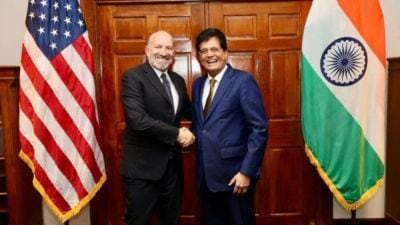Two weeks after the Waqf (Amendment) Bill was sent to a Joint Committee of Parliament following strong objections from the Opposition and the BJP-led government’s own allies favouring a detailed discussion on the proposed changes, the committee held its first meeting Thursday. Its chairperson, Jagdambika Pal of the BJP, later described the discussions as “fruitful”.

Parliamentary committee proceedings are privileged and details of exchanges between members during meetings are not made public.
Story continues below this ad
Sources in the JD(U) said the party is “yet to take a stand on the Bill as it is still being studied” and that its leaders have been in discussion with different Muslim organisations.
“We are in the process of studying the Bill. Once it is completed, our representative will reveal our view at the meeting,” a JD(U) leader said.
The Bill, introduced during the Budget session, proposed several changes including allowing a non-Muslim chief executive officer and at least two non-Muslim members to be appointed by the state government to the Waqf boards at the state level. It also proposed to make the District Collector the arbiter on whether a property is Waqf property or government land.
On August 9, a day after it was announced that the Bill would be sent to the joint committee, Parliamentary Affairs Minister Kiren Rijiju moved a motion in Lok Sabha for constitution of the committee and it was approved by the House. The joint committee has 21 members from Lok Sabha and 10 from Rajya Sabha.
Story continues below this ad
At the meeting Thursday, the Ministry of Minority Affairs was to make a presentation on the Bill.
The committee is expected to visit cities and hold consultations with state Waqf boards, organisations representing Muslims sects, and the All India Muslim Personal Law Board (AIMPLB). It may also publish advertisements inviting suggestions on the proposed law.
After the six-hour meeting, the committee’s chairperson Jagdambika Pal told reporters that the discussions were “fruitful”.
In a post on X, YSRCP Rajya Sabha MP V Vijayasai Reddy said his party would not support the Bill because it is “not acceptable in its current form”.
“In line with the decision of our party president Sri @ysjagan Garu and the party’s official stand, the Waqf Board amendment Bill was opposed by me in today’s meeting of the Joint Parliamentary Committee (JPC) with a rationale. This bill has many concerns of various stakeholders and is not acceptable in its current form. As a member of JPC, I would like to hear from all the stakeholders and be your voice in the committee. If there are any concerns, or objections that you have, then you can email me at venumbaka.vr@sansad.nic.in. I will put forth the concerns before the committee by way of a “dissenting note” which will form part of a permanent record in the annals of History.”
Story continues below this ad
In a post on X, Congress Lok Sabha MP Gaurav Gogoi said, “I attended the first meeting of the Joint Parliamentary Committee on the Waqf (Amendment) Bill 2024 in New Delhi today. I hope the committee will consider all viewpoints regarding this Bill and ensure that constitutional values and personal freedom is not encroached upon.”
The Opposition has reservations about several provisions including one empowering District Collectors to decide the ownership of disputed properties and another that allows non-Muslim members on Waqf boards.
Opposition MPs have questioned the provision that makes it mandatory for Waqf properties to provide deeds – they have asked how a deed for a Waqf property that has been used for decades will be produced now – and the proposal to remove Section 107 from the 1995 Act. That particular section explicitly barred the Limitation Act from being applicable to Waqfs and removing it would, in a way, encourage encroachment on Waqf properties to continue.
It is learnt that AIMIM Lok Sabha MP Asaduddin Owaisi has written to Jagadambika Pal, listing his observations. He is said to have taken strong exception to claims that wide consultations were held during the drafting process.
Story continues below this ad
Owaisi, it is learnt, has pointed out that important demands by previous panels on the same issue – that Waqf properties be considered public premises under Union and state eviction laws, or the Sachar Committee;s recommendations, including one on creating a separate cadre for Waqf enforcement – were not incorporated in the Bill, and that it proposes to take away all the powers of the state Waqf boards.


































